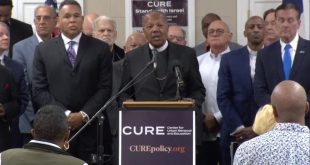 The Federal Communications Commission is looking to raise revenue – and the agency is in full pitch mode. The company is injecting itself as the middlemen between buyers (wireless carriers) and sellers (TV broadcasters) of spectrum, hoping to take a large commission check as a result.
The Federal Communications Commission is looking to raise revenue – and the agency is in full pitch mode. The company is injecting itself as the middlemen between buyers (wireless carriers) and sellers (TV broadcasters) of spectrum, hoping to take a large commission check as a result.
The FCC is hoping to raise $20 billion by matching the broadcasters who are willing to sell at the lowest prices with the wireless carriers willing to buy at the highest. The spread between becomes the government’s commission check. In typical government fashion, Congress already earmarked the funds to pay for a $7 billion nationwide network for first responders, with the additional funds going toward deficit reduction.
The problem: the FCC is handicapping itself. First, the agency has not given broadcasters any guidance as to how much to expect to receive in the auction. And though calling participation voluntary, FierceWireless notes that, “those broadcasters that do not participate will be able to continue broadcasting, though their systems might be modified to account for the wireless networks that could be built on the spectrum” [emphasis added].
Simultaneously, many of the broadcasters have pending deals that require FCC approval – a way for the agency to show preferential treatment or punish those that may not cooperate with the agency’s goals. In the recently approved-Sinclair Broadcast Group/Allbrittion deal, the FCC noted that the agency would continue to carefully scrutinize deals. That appears to be a thinly veiled warning to broadcasters to remain in the agency’s good graces, lest they be subject to long delays and burdens.
As a result, broadcasters are rightfully skeptical of the FCC’s intentions. The Chairman, who was a high-profile lobbyist for both the cable and wireless industries before assuming his current role, is not doing much to reassure broadcasters. The president of the National Association of Broadcasters even believes that the FCC’s goal is to “devalue broadcasters” in order to force the stations into generating revenue from spectrum sales. But, the NAB’s president knows of just 70 stations that are currently interested in selling – far too few to make the auctions a success.
Second, the agency is limiting the amount of spectrum available to AT&T and Verizon, the two companies with the most demand. Put simply, the agency is limiting the overall demand for spectrum by restricting how much these companies can buy.
As any high school economics student would tell you, lower demand equates to lower prices, and lower prices means lower supply. For the FCC that cycle results in a failed auction.
Yet, instead of changing some of these flawed policies, FCC Chairman Tom Wheeler is out on a nationwide PR tour to convince TV broadcasting companies to give up supply. He is already hyping the auction as “a once in a lifetime opportunity” to profit from selling back spectrum, but has yet to tell broadcasters what they might expect by way of revenue. With that much hype, it is unlikely those checks will be as large as broadcasters demand. How long before the Chairman shouts, “But wait, there’s more”?
Photo credit: The Cable Show (Creative Commons) – Some Rights Reserved
 Ken Blackwell is a senior fellow at the Family Research Council and the American Civil Rights Union, and on the board of the Becket Fund for Religious Liberty.
Ken Blackwell is a senior fellow at the Family Research Council and the American Civil Rights Union, and on the board of the Becket Fund for Religious Liberty.
 Black Community News News and Commentary for Christians
Black Community News News and Commentary for Christians



